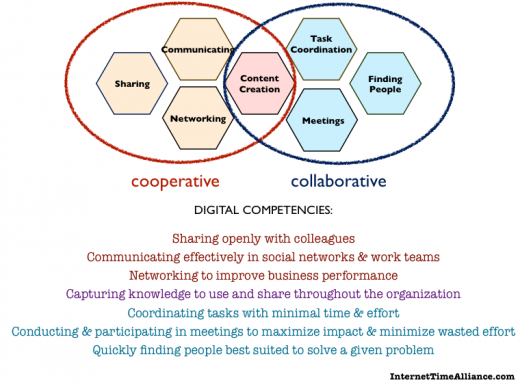Last month I wrote a post that included a presentation on enterprise social dimensions. It was based on three different perspectives I had come across. I recognized certain patterns and put these together to create a lens that could be used to determine if a selection of enterprise social network tools covered the spectrum of performance/learning needs in a networked workplace. The presentation has been well-received and so far I have not seen a similar approach.
In working with the framework, I realized that not only do the seven facets address tool requirements, but they can also be used to look at workplace competencies in the digital workplace. I am not a fan of competency models but these facets might be handy in creating professional development plans. The seven facets align with several parts of Jane Hart’s Smart Worker model, specifically – encouraging employee generated content; learning and sharing with others; and developing trusted networks of colleagues.
Both collaborative behaviours (working together for a common goal) and cooperative behaviours (sharing freely without any quid pro quo) are needed in the network era. Most organizations focus on shorter term collaborative behaviours, but networks thrive on cooperative behaviours, where people share without any direct benefit. This is the major shift we need in creating Enterprise 2.0 or social businesses. Being “social” means being human, and humans are much more than economic units. We like to be helpful and we like to get recognition. We need more than extrinsic compensation and our behaviour on Wikipedia and online social networks proves this. For the most part, we like to help others. This is cooperation, and it makes for more resilient networks. Better networks are better for business.
The image below shows an initial set of competencies that focus not just on collaboration, but also cooperation.




Harold,
I am curious how you have came to the distinction you make between cooperation and collaboration. I ask because I have known others in the field of adult learning who have used the term “collaboration” and “cooperation” interchangeably, and some that view collaboration as a more complex variant of cooperation. Both definitions are derived from root words that reflect working together, so there is not much of a distinction in the dictionary. So please say more about how you have arrived at this distinction.
Here is an earlier post on the subject of cooperation:
http://jarche.com/2009/06/co-operation-for-networks/
And an update this year:
http://jarche.com/2012/06/in-networks-cooperation-trumps-collaboration/
Thanks. In the context of a networked market in a discovery mode that would make sense, for cooperation would allow for emergent links and knowledge. In the context of a shared enterprise, I believe collaboration and cooperation are interdependent in so far as collaboration integrates purposefulness into the emergent knowledge derived from cooperative engagement. In cooperative inquiry, something I have been working with for nearly twenty years, people engaged in shared inquiry animated by a shared question (http://www.human-inquiry.com/cishortg.htm). The fruits of the inquiry typically serves the participants in personally relevant ways. This fruits of this inquiry can also be directed toward a particular purpose same inquiry can also be directed toward a shared endeavor, which adds a level of complexity to the process.
For example, a group of organizational mentors may engaged in a cooperative inquiry around the question of “How can we enhance our value as mentors to those we mentor?” After the conclusion of this particular inquiry this group may choose to develop a mentoring process derived from the fruits of their inquiry to share with other organizational mentors. In this way they shared work becomes a collaborative inquiry around the question of “How can we design a mentoring process to develop the skills and capacities of organizational mentors?”
Harold, I’d love to have a conversation with you around this sometime. I’m working on Mozilla’s Web Literacies framework which will lead to Webmaker (Open) Badges. Interestingly, we too have used hexagonal badges for these as they allow for interest-based pathways.
Sure, Doug. Ping me on Skype or G+ and we can set up a time.